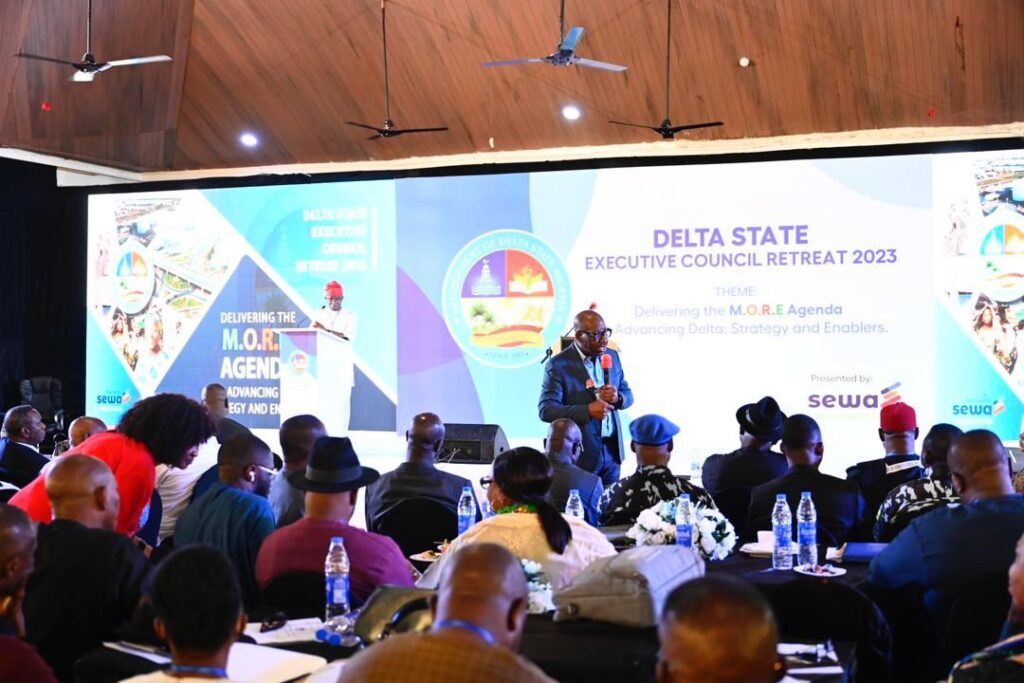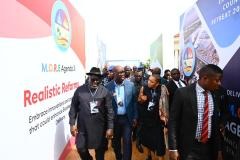
posted November 20, 2023
The Edo State Governor, Mr. Godwin Obaseki, has expressed grave concerns about persistent inflation and the dollarization of Nigeria’s economy, noting that it’s a reflection of the broader economic challenges faced by the country.
Obaseki spoke while delivering his keynote address at the Delta State Executive Retreat 2023 with the theme, “Delivering the M.O.R.E Agenda for advancing Delta: Strategy and Enablers,” held in Asaba, Delta State.
According to Obaseki, “Everything we do today is based on the dollar exchange rate, and it’s like most of our existence depends on what we import. Imagine a Country of 200 million people that has to depend on an external economy.
There are three key points that the Governor highlighted which demand serious review and resolution. They are inflation, dollarization and dependence on imports.

Inflation is the rate at which the general level of prices for goods and services rises, eroding purchasing power. Persistent inflation can have negative effects on a country’s economy, affecting the cost of living, savings, and overall economic stability.
Dollarization refers to the widespread use of a foreign currency, such as the U.S. dollar, alongside or instead of the domestic currency. Obaseki suggests that Nigeria’s economy is heavily influenced by the dollar exchange rate, indicating a reliance on imported goods and services priced in foreign currencies.
Obaseki further highlights the challenge of a large population relying on imports, which are often priced in foreign currencies. This dependence can make the economy vulnerable to external factors, such as fluctuations in exchange rates and global market conditions.
He said, “We spend about $40 billion a year in this country and you would expect that it should be enough for any country to develop but no, today, we earn less but our demand for foreign exchange is more.
“We spend about $2 billion paying school fees abroad, $3 million for healthcare treatment abroad, about $500 million buying milk and milk products, and about $10 billion importing food. We no longer earn dollars as we used to but the dollars keep going up. We will deal with inflation for a long time.”



The governor who noted the need for deliberate steps to change the narrative, said, “Four years ago, it was a different world, a different country, and a different Delta State but things are different today regarding how we handle our development because COVID-19 has changed our thinking. Nobody envisaged that there would be a pandemic that will put the world on a standstill. So, it’s not advisable to continue to adopt the same method.
“The implication is that leaders across the world pumped money into the economy to keep the economy moving and this led to global inflation which we never had in many decades and centuries.
“States, and local governments all go and collect salaries and spend more than they earn from oil. They just collect money from Abuja to just share and no country develops like that.
“The Federal Government has the responsibility of monitoring and fiscal policy. They can go the extra mile of printing money and spending what is not there. The Federal Government over the decade has perfected that and it got to a crisis point in the last administration in Nigeria.
“The nation has to deal with unprecedented levels of inflation. Inflation in Nigeria has gone up to almost 30 percent today. Who can borrow money and pay interest of 30 percent? It’s not possible. If you are not giving me 30 percent of my money, I am actually losing money. Can an economy operate like this at 30 percent? Who can borrow at 30 percent to do business and make a profit? It’s not possible.
“By the time a State borrows at 30 percent, will it be able to pay back? It will spend most of its resources paying debt. What is frightening and worrisome is that we depend so much on dollars for our existence. The exchange rate is all we focus on. In Nigeria, we focus on the exchange rate instead of worrying about the interest rate because everything we do today is centered on the dollars.”
The Edo State Governor’s call for an “urgent economic policy review” suggests a recognition of the need to reassess and potentially reform existing economic policies. This could involve measures to address inflation, reduce dependence on imports, and enhance economic resilience.
The key takeaway from Obaseki’s remarks at the Delta State Executive Retreat 2023 underscore the challenges and complexities of Nigeria’s economic landscape, with a call for proactive measures to address issues such as inflation and the dollarization of the economy.
In his address, the Governor of Delta State, Sheriff Oborevwori thanked Governor Godwin Obaseki for the insight, noting, “We are proud to have you in our midst as we consider it very important for you to participate and share your experience of over seven years as governor of Edo State.”

